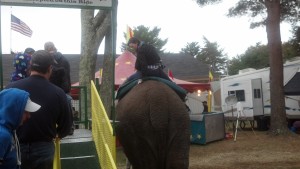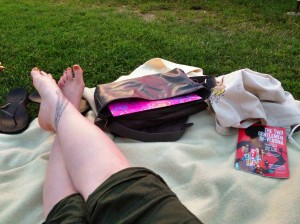Last night, in a ceremony which officiates my true induction into the Tufts theatre community, I got to see my first production at Tufts. Currently playing in my department is a show which they have dubbed Oedipus/Antigone. It’s a creative cutting of the first and last shows of the Oedipus cycle in which act one is Oedipus and act two is Antigone. Our show plays with an ensemble cast; the actors who perform leads in the first half duck into the chorus during the second, and vice versa. Only Creon remains as, well, only Creon remains.
Let’s talk about the physical space available at Tufts for a moment. Our productions occur in the Balch Arena Theatre, a challenge in itself. An arena

Great shot of our theatre
theatre is what it sounds like – picture a miniature sports arena. The stage is round and at the center of the pit with the house raked around it either in the round or three quarters. Ours can be converted from the round to three quarters depending on the needs of the production (which is a godsend as performing in the round is debatably one of the most difficult things to do in theatre).
For Oedipus/Antigone, the set was simple and beautiful. It was performed in three-quarters with a multi-tiered platform built into the stage. The platform and accoutrements had the appearance of being made from stone. At the platform’s center was a fire circle, a sunken pit filled with charred bits of rock. It served as a focal point for the production and a sort of touchstone for the actors. Also, it kept them from doing what comes extremely naturally in a space like this: planting oneself center and staying there.
At the back wall was a giant triangle spanning almost floor to ceiling in this double-high auditorium which appeared to be made from pottery shards. At the center of the triangle was a giant set of double doors arrayed in Greek brass and which served as the Theban palace.

Since so little information is available to us about Greek Theatre, many surmises are (perhaps erroneously) made from pottery.
Simplistic, but wonderful. The levels allowed for interesting stage pictures (and the chorus created them – often times making complicated scenes out of their bodies to accompany the lengthy chorus speeches). Without being finicky or overdone, the set was transporting and brought us to a place long ago and far away.
Now let’s talk about the nitty-gritties of reviewing a college production. How does one go about it? The innate problem is that, while the students working on said production are surrounded and supported by professionals, they themselves are just students. The lighting, sets, direction, and costumes can be professional quality, but the actors are still early in their career, without a great deal of experience, and for the most part just starting to learn about themselves much less their craft. I think it unfair to hold a college production to professional standards. I am always ready to be pleasantly surprised, but I never walk in holding my breath for something transcendent to happen. Inevitably, that leads to disappointment.
There were, without a doubt, some incredible performances last night. There were mediocre ones as well, but not to the point of ruining my evening. For the most part, the ladies stole the show. Jocasta was a powerhouse. Antigone was utterly breathtaking. The Messenger in Act II managed to insert no small amount of humor into the pressing clouds of despair.
Greek theatre is hard. Make no bones about it. It involves lofty concepts, larger-than-life people, and intensely high-stakes situations. More than that, its language (due to eons and eons of translation passed down generation to generation) can be clunky and unwieldy. Rather than present a great deal of onstage action, instead we are left with long speeches describing the most exciting bits of the story which have occurred offstage.
We live in a visual culture. Television, movies, youtube, the instant access to vast amounts of information available day or night at our fingertips… all this and more have created a society of people impatient and infinitely fixated upon the idea of seeing. The Greek theatre is a theatre of hearing even to a greater degree than the theatre of Shakespeare. To understand, one must open up and listen.
Last night was dollar night. The second Thursday of every run of every show at Tufts is open and available to any who wish to come see it for a dollar a seat. What this mostly means is a theatre full of giggling undergrads seeing their friends or fulfilling course credit of some kind. I was more than interested to see how they dealt with the text.
Of course, cutting two full-length plays down to one act each ensures that most of the lengthy talky bits wind up in the circular file. This strategy was one perhaps necessary given the audience… could the undergrads have sat through two full length Greek tragedies without losing interest or tweeting?
The only disturbing thing which I did notice from the audience was a certain hesitancy to engage and fear of the text. Theatre shouldn’t be scary. When something is funny, you laugh. When something is moving, you cry. When something is surprising, you gasp. There were certainly instances of all of the above in last night’s performance, but it seemed like myself and my companions were some of the few to understand the concept of active engagement. Has the theatre become so lofty that we are afraid to laugh? I mean, yes, it’s Greek, but can’t we give ourselves permission to enjoy anyway? The attitude of oppression from this young audience disturbed me.
But how do you teach an audience to interact with a piece? Is this the sort of thing they must learn by example and since theatre is becoming less and less of a commonplace past-time we are doomed to future auditoriums full of fearful audiences?
of thing they must learn by example and since theatre is becoming less and less of a commonplace past-time we are doomed to future auditoriums full of fearful audiences?
On the flip side of the coin, to my great relief, as I looked around I noted only one individual asleep in his seat and I didn’t see a single cell phone out the entire performance (though there were three instances of ringing phones during the production, but I suppose one must choose one’s battles). So perhaps, while intimidated, this audience was at least respectful. Maybe there is hope after all.





 of thing they must learn by example and since theatre is becoming less and less of a commonplace past-time we are doomed to future auditoriums full of fearful audiences?
of thing they must learn by example and since theatre is becoming less and less of a commonplace past-time we are doomed to future auditoriums full of fearful audiences?